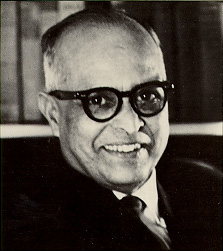
picture from Photograph(26k)] |
for "Annamalai"; "Under the Banyan Tree"
|

picture from Photograph(26k)] |
for "Annamalai"; "Under the Banyan Tree"
|
General Information
The following information is offered by Anoop Sarkar.
"I'd be quite happy if no more is claimed from me than being just a story-teller. Only the story matters, that is all. If readers read more significance into my stories than was meant originally, then that's the reader's understanding of things. But if a story is in tune completely with the truth of life, truth as I perceive it, then itt will be automatically significant."
"R. K. Narayan was born in Madras in 1906 and educated there and at Maharajah's College in Mysore. He has lived in India ever since, apart from his travels. Most of his work, starting from his first novel Swami and friends (1935) is set in the fictional town of Malgudi which at the same time captures everything Indian while having a unique identity of its own. After having read only a few of his books it is difficult to shake off the feeling that you have vicariously lived in this town. Malgudi is perhaps the single most endearing "character" R. K. Narayan has ever created.He has published numerous novels, five collections of short stories (A Horse and Two Goats, An Astrologer's Day, Lawley Road, Malgudi Days, and The Grandmother's Tale), two travel books (My Dateless Diary and The Emerald Route), four collections of essays (Next Sunday, Reluctant Guru, A Writer's Nightmare, and A Story-Teller's World), a memoir (My Days), and some translations of Indian epics and myths (The Ramayana, The Mahabharata, and Gods, Demons and Others).
In 1980, R. K. Narayan was awarded the A.C. Benson award by the Royal Society of Literature and was made an Honorary Member of the American Academy and Institute of Arts and Letters. In 1989 he was made a member of the Rajya Sabha (the non-elective House of Parliament in India). He received the Sahitya Akademi Award for The Guide (1958).
R. K. Narayan's full name is Rasipuram Krishnaswami Ayyar Naranayanaswami. In his early years he signed his name as R. K. Narayanaswami, but apparently at the time of the publication of Swami and Friends, he shortened it to R. K. Narayan on Graham Greene's suggestion."(from R. K. Narayan:
a Profile)